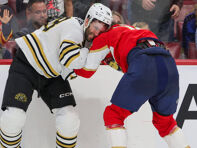As the Director of Event Operations for the New Jersey Devils and Prudential Center, my main responsibility is to make sure that the show goes on without a hitch, whether it is the season kickoff event for New Jersey Devils Season Ticket Members or minutes before a performer is scheduled to go onstage in front of 17,000 screaming fans.
When I tell friends about what I do at work, everyone usually wants to know if artists really do request only red M&Ms in their dressing rooms, and what it’s like to work for a professional sports team. While these are key components of what I do, I love talking about something even more important: how I strive to be an agent of change in the community by harnessing the power of the sports and entertainment industry in my role with the organization.
In June of this year everyone’s lives were rocked by the Pulse massacre in Orlando. Gay bars, a safe haven for the LGBTQ community, were safe no more.
The Monday following the attacks I had a call with the You Can Play project, a hockey-centered organization that “works to ensure the safety and inclusion of all in sports – including LGBTQ athletes, coaches and fans” to find out more about what the New Jersey Devils could be doing to help further their message. After that horrendous weekend in Orlando, the call gave me hope that we all have the ability to be agents of change in our own community. It also became even clearer to me why You Can Play is so important: in every walk of life – including the traditionally hyper-masculinized sports world – we need to make sure everyone feels included and safe to help make sure something like this never happens again.
Only weeks after the Pulse shooting, I was able to march proudly and without fear with New Jersey Devils colleagues and season ticket members in the Newark Pride Parade. It was a pivotal moment for me and reminded me of the power of sports. Here I was marching with an incredible group of people proclaiming that it is ok to be who you are, be proud, and especially not afraid. This is something I never could have imagined when I started working for the team eight years ago when I was nervous to come out to colleagues.

I had already benefitted immensely from this concept while being an out member of the George Washington University cross-country team. Under the sweltering DC sun while running around the monuments and on the long van rides to competitions, I bonded with my teammates. I will be forever grateful for the love and support they showed me when I came out to them.
My family was equally accepting while making sure that I knew that they will love and support me regardless of who I love. To this day, I still think of how fortunate I am to have had this support and how this is not the case for so many other young LGBTQ people today.
Being able to come out to supportive family members and teammates helped me immensely when I was younger, but the need to "come out" never really ends – and it only gets slightly easier over time.
When I first began working for a professional hockey team, I found myself hesitant to come out to co-workers. I quickly reverted back to being coy, just as I did when I was in the closet in college. I was able to play off any questions about a girlfriend by saying that I didn't have time to date due to my work schedule – a standard tactic for many closeted people.
After a while, an insightful co-worker caught on and finally asked if I had a girlfriend or "possibly a boyfriend." While I didn't, I nervously told her she was "closer with the second option than the first.” Over time, word spread through my immediate co-workers, and I was lucky enough to have an incredibly supportive family at work as well. Again, this is a privilege not everyone is afforded, especially in a country that does not have federal laws to protect LGBTQ employees from workplace discrimination.
I eventually gained the courage to bring my boyfriend to corporate events, where I have introduced David to my colleagues and the senior leadership team. Everyone he has met, including the president of the New Jersey Devils, has been incredibly welcoming. In fact, I'm fairly certain that some of my colleagues like him more than they like me.
While I have received an immense amount of support during the past eight years that I've worked at the Prudential Center, it would be a lie to say I never heard someone say "that's gay" in the workplace or use an offensive slur at a game. For me, each time I hear these things I use it as a learning opportunity (usually with some humor involved).
For instance, when a co-worker described a promotional item as "gay,” I told her that if it was actually designed by someone who was gay, it would be a lot more appealing. While I know my co-worker did not mean to use the term in an offensive way, I showed her that using that language is not acceptable and only serves to make others feel uncomfortable or "on the outside.”
Being inclusive in everything we do should be a goal that everyone strives for in every situation. Nine out of ten gay teens reported being bullied in high school – and I was certainly one of them. It's important for kids to know that it does in fact get better, and I hope to use my small role in the larger sports world to make sure that those kids know this.
Every day I'm encouraged by the incredible LGBT activists who stand up for equality. From Braeden Lange and his work with The Courage Game to Patrick Burke and his work with the You Can Play organization, the power of sport to affect social change is real and fully on display.
I feel privileged to work with supportive friends who have embraced me for who I am and a company who fully supports this initiative, and I look forward to playing a part in the New Jersey Devils' You Can Play campaign this season. However, until everyone feels comfortable to come out in every situation, our work will not be over.
You can find Joe Altenau on Facebook and LinkedIn, or on Twitter @JoeAltenau. You can also reach him via email at [email protected].
Read more about the New Jersey Devils at All About The Jersey.
Edited by Cyd Zeigler







































